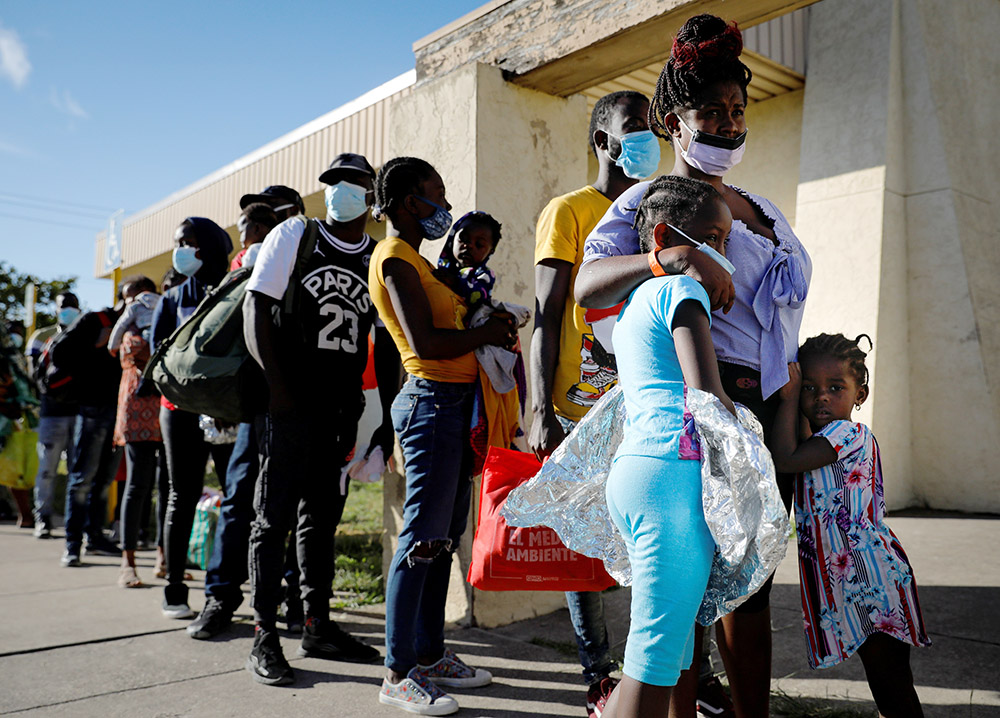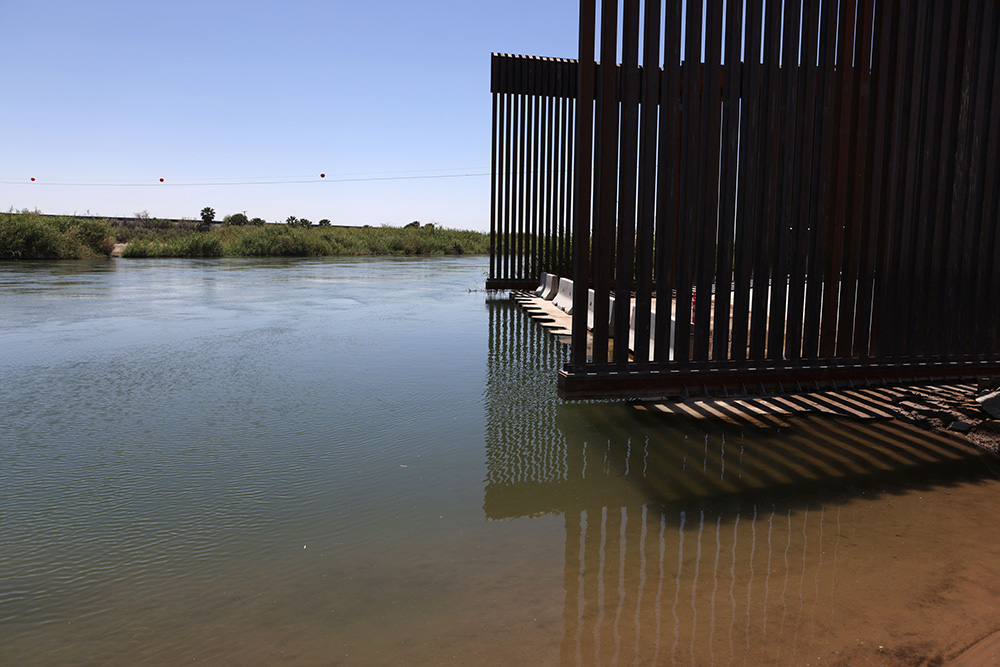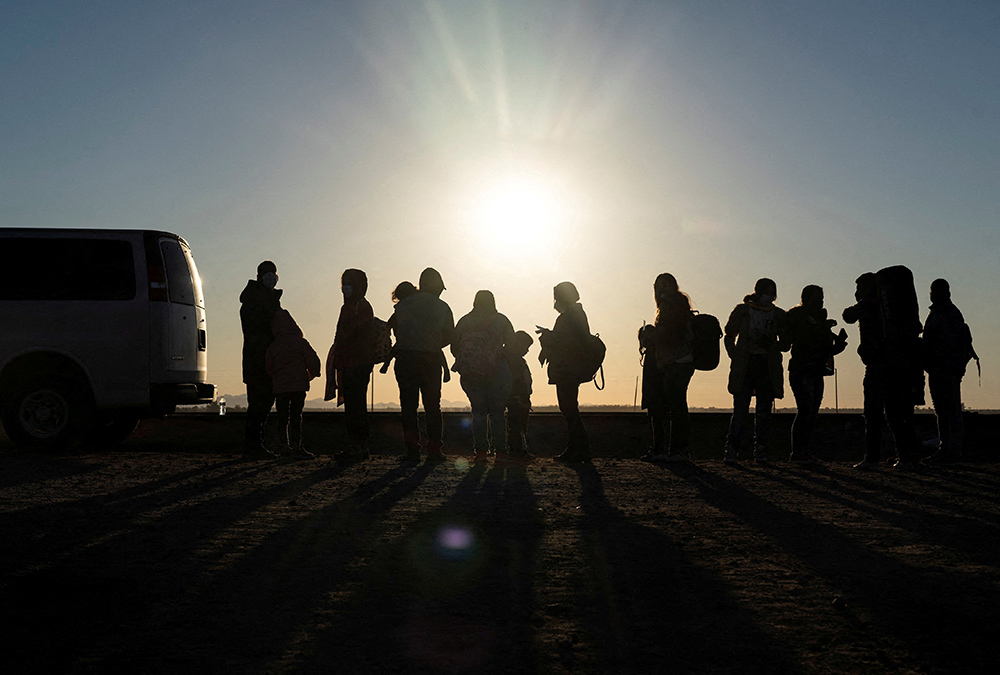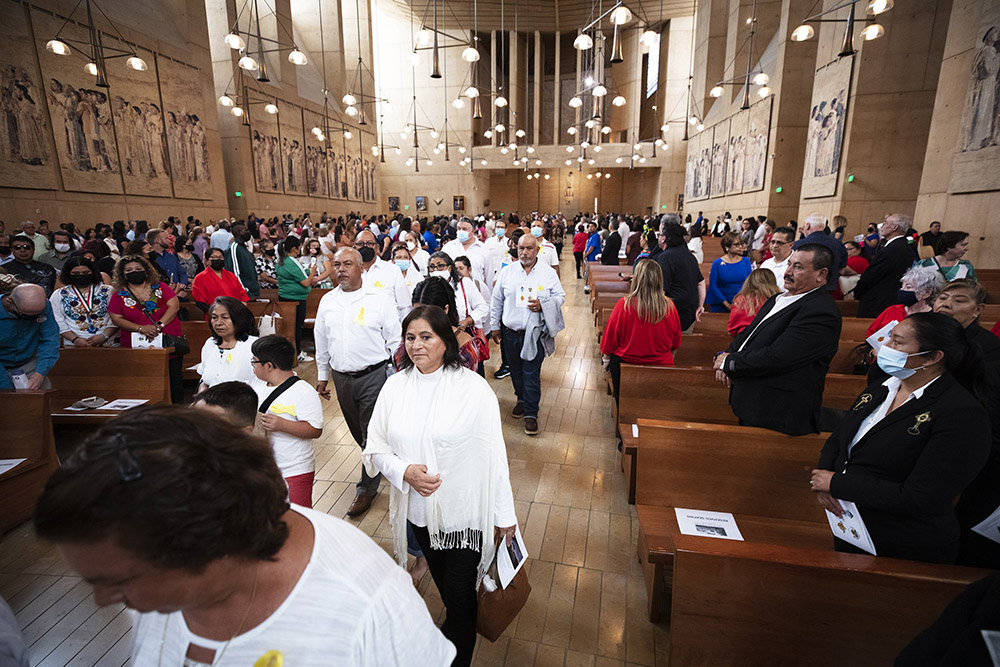
Migrants released from U.S. Customs and Border Protection in Del Rio, Texas, wait in line to board a bus to Houston Sept. 24, 2021. (CNS/Reuters/Marco Bello)
While many public debates can often turn on language, there is none more so than the national immigration debate. The impact one term can have on public opinion is both astounding and frustrating, especially when that term does not accurately describe reality.
Immigration is a complex issue, but unfortunately the debate over immigration is often conducted in sound bites — short terms or phrases that are used over and over by the participants and the media to evoke an emotional, rather than rational, reaction. As such, misinformation can breed misunderstanding, and we find ourselves talking (and sometimes screaming) at each other, rather than talking to each other.
From a Catholic social teaching perspective, immigration is an issue about human beings who are attempting to improve their lives and, in many cases, simply to survive. This is a quest that any human being would seek if placed in a certain position.
As Catholics, we have a responsibility to speak about our fellow human beings in a manner that respects their human dignity and safeguards their lives. To facilitate this effort, Catholics should be aware of some of the terms that dehumanize our fellow human beings, while at the same time promoting language that recognizes them as persons imbued with God-given dignity.
The following are some terms and phrases that Catholics and others of goodwill should avoid, coupled with alternative suggestions. You may be surprised how much power these negative terms can have and how important it is to, as they say, change the terms of the debate.

The Colorado River flows past the border wall in Andrade, California, April 19, 2021. (CNS/Reuters/Jim Urquhart)
Secure the border: This phrase is frequently used, mainly by immigration opponents, to describe the situation at the U.S.-Mexico border. While it sounds reasonable, it relays a few negative messages about immigrants that subconsciously can lead to a negative impression of them and the border reality.
First, the term "secure" implies that the persons who are crossing the border, often in search of safety, are a threat to us. When we "secure" our doors and windows at home, for example, it is to keep someone with nefarious purposes from entering and harming us.
In reality, however, the vast majority of human beings crossing the border come to find work to support their families, apply for asylum in search for protection or to reunify with a family member. While there are criminal elements present near our border, such as drug and human smugglers or human traffickers, in reality the migrants are themselves fleeing terror and persecution in their home countries.

Migrants seeking asylum in the U.S. are seen in Yuma, Arizona, Jan. 23, 2022. (CNS/Reuters/Go Nakamura)
Second, opponents use the phrase to slow down, and even stop, any discussion about reforming the immigration system, including a legalization program for undocumented immigrants. They argue that no reforms can proceed without first "securing" the border. This concept has often been reflected in proposed immigration reform legislation.
However, opponents leave the term intentionally vague, so they can change it as they see fit. In other words, some will argue that the border is not "secure" until not one person can cross it illegally. Of course, this is logistically unsustainable, given that the U.S.-Mexico border is 2,000 miles long.
What term can be used to more accurately reflect reality? Finding an effective sound bite to describe a complex situation is not easy. The government often uses the term, "operational control," which indicates that the government has control over the border. Another preferable phrase is to maintain the "integrity" or, more simply, "control" of the border.
In truth, one of the ways to address the border is to create more effective programs to allow migrants to enter the country legally, either on a temporary, or, ideally, permanent basis. This would be in the interest of migrants, who desire to enter safely, and the nation, which is in need of immigrant labor.
Advertisement
Illegals: The inhumane term of "illegals" has seeped into our national discourse, pushed by some politicians and conservative media who use it to dehumanize immigrants and to suggest they have no legal rights whatsoever, which is untrue under our legal system. The hideous undercurrent here is that these persons are not human beings.
For obvious reasons it should be rejected and called out when used. It should go without saying that no human being, created by God, is illegal. More respectful terms include "undocumented" or "unauthorized," or more accurate terms such as "asylum seekers" or "refugees," to describe persons crossing the border and seeking refuge.
Amnesty: Opponents of immigration will call any proposal allowing migrants to remain in the country, either temporarily or permanently, as an "amnesty." The word is defined as forgiveness, which is an act at the center of the Christian life, so it should not be a dirty word, especially among Catholics. But, given that it is perceived as a giveaway, other terms would be better received by the public and better reflect the reality of immigration reform initiatives.
Proposals today require that immigrants take several steps in a yearslong process including working, paying taxes and waiting in their proper place in line, before they can access permanent residency. This is not an amnesty in the traditional sense, as it requires immigrants to take steps to correct the offense of entering illegally. It is more accurately described as a "path to citizenship," or "earned citizenship."

Volunteers and ministries serving immigrants from the Southern California archdioceses of Los Angeles, Orange, San Diego and San Bernardino process into the annual Mass in Recognition of All Immigrants at the Cathedral of Our Lady of the Angels Sept. 18. (CNS/Angelus News/Victor Alemán)
Rule of law: The term "rule of law" can be misused in the immigration debate. Opponents of immigration use it to imply that those who threaten it, such as migrants, are undermining a basic tenet of democracy and our way of life. But many of our laws are flawed, violate human dignity and should be reformed.
The power of a democracy is that a nation can change laws that are ineffective, unjust and do not meet the nation's needs.
Proponents of immigration reform should make the correct argument that reform of the current system, which is ineffective and fails to meet our long-term needs, would uphold the rule of law, as it would establish a system that works and prepares the nation for the future.
These are a few of the terms in the immigration debate that should be considered as suspect. How we use language conveys a message that can set the tone of the debate. Sadly, our immigration debate too often employs language that puts newcomers as the "other" and not as our fellow human beings, thus creating, as Pope Francis says, a "culture of indifference."
Catholics and others who care about immigrants and refugees should more strenuously reject this language and create a new vocabulary of immigration. How we refer to our fellow human beings can change the tone of a national debate and, over time, lead to just laws that are in the interest of migrants and our nation.








